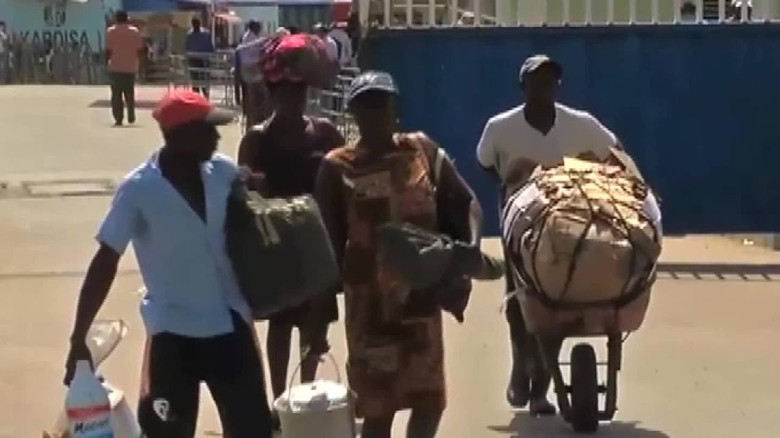Results 1 to 1 of 1
Thread Information
Users Browsing this Thread
There are currently 1 users browsing this thread. (0 members and 1 guests)
-
02-24-2016, 05:06 PM #1
Dominican Born Haitians Not Citizens--says Court
http://www.cnn.com/2013/10/24/world/...enship-ruling/
Some Dominicans suddenly outsiders in their own country
By Mariano Castillo, CNN
Updated 2:15 PM ET, Thu October 24, 2013
Some Dominicans who have never traveled outside of their country of birth could suddenly find themselves outsiders.
The citizenship of tens of thousands of Dominicans of Haitian descent may be stripped, the result of a court ruling that affects those who were born to parents who were in the country illegally.
Dominicans of Haitian descent have long faced inequalities, but the enforcement of the last month's ruling will take social exclusion to an extreme.
The question of how to integrate immigrants into the national fabric and how to treat them is a familiar debate. In the Dominican Republic, as in the United States, for instance, children of undocumented parents are considered citizens if they were born in the country. But while there have been efforts in the United States to extend opportunities to even more children of immigrants, the Constitutional Court of the Dominican Republic has taken a very different approach.
The court ruled that even those who were born in Dominican territory, if their parents were in the country illegally, should not have citizenship.
"This is absurd. How are they going to take away a document that I already have, that is mine, and give me one as a foreigner when I have never been outside of the country?" said Ana Maria Belique, a representative of a movement to protect the rights of those affected.
Already, since 2007, a law blocked many Dominicans of Haitian descent from acquiring copies of their birth certificates or national identification cards.
One of those blocked from getting a national ID card was 29-year-old Juliana Dequis Pierre, who then took her fight to the courts.
The high court affirmed that Dequis Pierre did not meet the criteria for citizenship, even though she had been born in the country. The court went further, asking authorities to identify similar cases stretching back to 1929.
The U.N. Refugee Agency expressed concern, stating that, "Should this process indeed be carried out without the necessary safeguards, three generations of Dominicans of Haitian descent could become stateless."
The country's National Migration Council on Wednesday met with representatives of various government ministries and agencies to plan how the court ruling will be enacted.
The government says that no one who has their citizenship stripped will be deported, and that a system to give them legal status with a path to citizenship will be put in place. That path to citizenship will include a two-year wait to begin the process.
"The Dominican government reiterates its commitment to the implementation of an immigration policy that is clear and transparent, in line with the Constitution and Dominican laws while respecting human rights and international accords," government spokesman Roberto Rodriguez Marchena said.
The government's assurances, however, have not ameliorated the fears of Dominicans of Haitian descent, who are protesting and calling for support at home and abroad.
"This measure affects us so much that we can't do anything," said Elena Lorac, the daughter of Haitian immigrants. "This brings consequences such as not being able to work, not being able to study, to not realize the dreams that we have to get ahead in life."
Critics point out the complications that are sure to arise: What about mixed-status families? How can it be that many who cast votes that affected election outcomes are losing that right? What about all the taxes they paid as citizens?
"We are not talking about immigrants, but fellow Dominicans," said the Rev. Mario Serrano, national director of social work for the Jesuits in the Dominican Republic.
Many Dominicans of Haitian descent are already among those with the fewest economic resources, and this takes away the little they have, he said.
"They don't have access to the same rights because they are being treated like immigrants in their own country," Serrano said. "In truth, they have not immigrated from anywhere. Many of them have never been outside of the Dominican Republic."
http://www.cnn.com/2015/06/16/americ...lic/index.html
What happened: The September 23 court ruling retroactively denies Dominican nationality to anyone born after 1929 who does not have at least one parent of Dominican blood, under a constitutional clause declaring all others to be either in the country illegally or "in transit."
The government came up with a "regularization" plan that would allow those with approved ID to stay for 2 years.
For decades, the government granted citizenship to all children born on Dominican soil, except those considered in transit, such as foreign diplomats posted in the country. The children of hundreds of thousands of immigrants were automatically granted citizenship once their birth was registered.
But in 2004, the government introduced a migration law that expanded definition of "in transit" to include the children of immigrant citizens without documentation. The government formalized that distinction in 2010 when it passed a new constitution.
Mass deportations of Haitian immigrants from Dominican Republic feared

By Mariano Castillo and Diulka Perez, CNN
Updated 1:27 PM ET, Sun June 21, 2015

Haitians face deportation from Dominican Republic 01:51
Story highlights
- A law in the Dominican Republic offered to "regularize" undocumented immigrants
- The deadline is Wednesday; tens of thousands were unable to sign up
- Some fear mass deportations of migrants, the majority of (CNN)Tens of thousands of undocumented immigrants in the Dominican Republic -- the vast majority Haitians -- face deportation as a deadline to apply for legal status looms.
The problem of what to do with thousands of workers who entered illegally from a neighboring country is not an unfamiliar one in the hemisphere. The plight of undocumented immigrants in the United States and lawmakers' failed attempts at reform come to mind.
The Dominican government tackled the issue with a "regularization plan" that offered a path to legal status for the undocumented. But critics say it was designed to fail the migrant workers.
Wednesday is the deadline for undocumented immigrants in the Dominican Republic to register under the regularization plan or face deportation.
"Those who do not have documentation will have to return to their country," Dominican Foreign Minister Andres Navarro said.
According to the government, more than 200,000 undocumented immigrants living in the Dominican Republic have registered, but at least that many others will not meet the deadline.
Claims of racial prejudice
The fact that the majority of foreigners -- documented or not -- living in the Dominican Republic are Haitian has led to accusations that there are other racial prejudices involved, too.
The immigration overhaul comes at the same time that Dominicans of Haitian descent are in a fight over their status. A 2013 court ruling stripped the citizenship of Dominicans whose parents were undocumented immigrants. A separate law to address their status is equally controversial.
Human rights groups fear mass deportations.
The regularization law states its purpose is to "provide a window of opportunity" for undocumented workers to contribute without living in the shadows and to reap the benefits of legal protections offered by the government.
Some Dominicans suddenly outsiders in their own country
But to hear it in immigrants' own words, those words don't correspond with their experience.
"Today is my 15th day here, and I still have not been able to get my documents," Haitian immigrant Ruben Renoir told CNN en Español as he waited in a line to apply for legal status.
Another immigrant shared a similar story: "I came here with my birth certificate to apply because I knew that there were going to be problems, but they still haven't processed me," Melizo Pierre said.
A problem with documentation
To human rights observers, this is not surprising.
Many of the undocumented workers in the Dominican Republic lack valid passports or other identification documents from their home countries.
Some 96% of those who have applied for regularization don't have passports, Angelita Baeyens, programs director at the Robert F. Kennedy Center for Justice and Human Rights, told CNN.
Another requirement is for employers to provide the undocumented workers with a certificate, something that many are refusing to do, Baeyens said.
Haitian officials, meanwhile, are preparing for an influx of deportees as the deadline passes.
At least two repatriation centers have been opened on the border between the two countries to process the Haitians who are sent back from the Dominican Republic.
The deadline also worries some people who were born in the Dominican Republic. While there is separate legislation to deal with Dominicans who were stripped of their citizenship, those Dominicans born to Haitian immigrants but not registered in the civil registry fear being swept up in deportation raids.
CNN's Mariano Castillo reported and wrote the story in Atlanta. CNN en Español's Diulka Perez reported from the Dominican-Haitian border.
whom are Haitian
"Men of low degree are vanity, Men of high degree are a lie. " David
Join our efforts to Secure America's Borders and End Illegal Immigration by Joining ALIPAC's E-Mail Alerts network (CLICK HERE)
Similar Threads
-
ICE removes Dominican-born Spanish citizen wanted for drug trafficking
By JohnDoe2 in forum illegal immigration News Stories & ReportsReplies: 0Last Post: 04-15-2015, 02:34 PM -
Dominican court stripped citizenship from anyone born to illegal parents after 1929
By JohnDoe2 in forum illegal immigration News Stories & ReportsReplies: 2Last Post: 12-19-2013, 10:39 AM -
Supreme Court decision, all born in U.S. are natural born
By JohnDoe2 in forum Other Topics News and IssuesReplies: 0Last Post: 04-27-2011, 08:54 PM -
Should all babies born here be citizens?
By JohnDoe2 in forum illegal immigration News Stories & ReportsReplies: 7Last Post: 08-14-2010, 05:06 AM -
Dominican Immigration deports over 1,300 Haitians
By lsmith1338 in forum illegal immigration News Stories & ReportsReplies: 2Last Post: 10-16-2006, 07:08 PM


 1Likes
1Likes LinkBack URL
LinkBack URL About LinkBacks
About LinkBacks




 Reply With Quote
Reply With Quote

Arizona GOP pushing tough, new border policies, but faces strong...
05-05-2024, 10:24 AM in illegal immigration News Stories & Reports